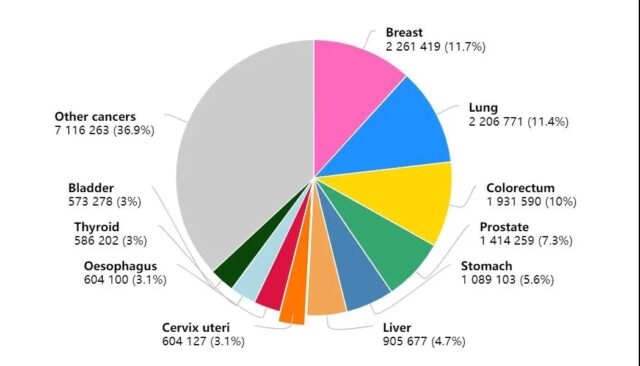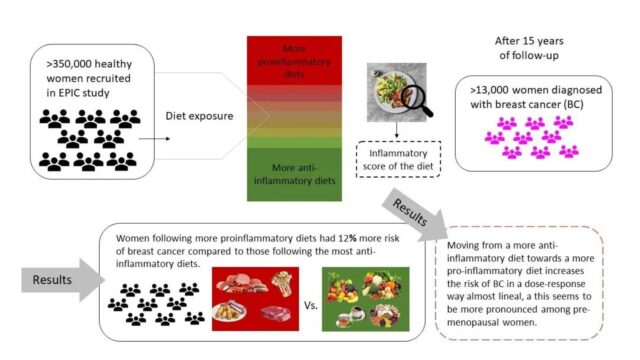“Pro-inflammatory” food has high risks on breast cancer after 15-year study
- Normal Liver Cells Found to Promote Cancer Metastasis to the Liver
- Nearly 80% Complete Remission: Breakthrough in ADC Anti-Tumor Treatment
- Vaccination Against Common Diseases May Prevent Dementia!
- New Alzheimer’s Disease (AD) Diagnosis and Staging Criteria
- Breakthrough in Alzheimer’s Disease: New Nasal Spray Halts Cognitive Decline by Targeting Toxic Protein
- Can the Tap Water at the Paris Olympics be Drunk Directly?
“Pro-inflammatory” food has high risks on breast cancer after 15-year study on more than 300,000 women
“Pro-inflammatory” food has high risks on breast cancer after 15-year study. In January 2021, World Health Organization (WHO) International Agency for Research on Cancer (IARC) released the latest global cancer burden data for 2020.
The latest estimated data shows that in 2020, there will be 19.29 million new cancer cases worldwide, of which 2.26 million new cases of breast cancer, surpassing 2.2 million cases of lung cancer. Breast cancer replaces lung cancer and becomes the world’s largest cancer.

The top ten cancer types with the number of new cancer cases in 2020
Many studies have shown that eating habits are associated with a variety of cancer risks, including breast cancer, which also means that through dietary adjustments, cancer risks can be prevented and reduced. There is evidence that a diet rich in plant foods, fewer animal products, and refined carbohydrates is associated with a lower risk of breast cancer after menopause.
And a recent clinical trial found that women on the Mediterranean diet have a lower risk of breast cancer. The Mediterranean diet has many of the characteristics of an anti-inflammatory diet-rich in fish, vegetables, whole grains and high-quality fats, while red meat and processed foods The content is lower.
In addition, eating habits affect weight, and obesity increases the risk of various cancers.
On June 7, 2021, at the annual meeting of the American Academy of Nutrition, a research team from the University of Barcelona in Spain reported their findings: A diet that promotes inflammation may increase the risk of breast cancer.
In this study, Carlota Castro-Espin and his team used data from a long-running European adult diet and cancer risk research project. They focused on more than 318,000 women who did not have breast cancer in the first place.
The research team assigned a score to each woman based on the nutrients and other compounds in the diet reported by the participants and assessed the “inflammatory potential” in their diet.
In about 15 years, more than 13,200 of these 318,000 women have been diagnosed with breast cancer. Compared with the 20% of women with the lowest inflammatory diet, the top 20% of women with the most inflammatory diet had a 12% higher risk of breast cancer.
The research team said that after excluding factors including weight, drinking habits and exercise, the link between inflammatory diet and breast cancer risk still exists.
The research team also said that in addition to food choices, it is also recommended to limit alcohol, which is related to a variety of cancers, including breast cancer.
The research team also encourages people to maintain a healthy weight and exercise regularly—at least 150 to 300 minutes of moderate activity per week, such as brisk walking.
In general, this large-scale study found that the more women consume “pro-inflammatory” foods that cause chronic and low-grade levels of the body, the higher their risk of breast cancer.
The first author of the study, Dr. Carlota Castro-Espin, said that this so-called “pro-inflammatory” food is rich in red and processed meats, sugars and saturated fats. This type of diet may cause breast cancer because it promotes inflammation, and it lacks foods that fight inflammation (eg vegetables, fruits, legumes, fiber-rich grains and “good” unsaturated fats) .

The research team reported the results of this research at the annual meeting of the American Academy of Nutrition this week and has not yet been officially published in academic journals.
(source:internet, reference only)
Disclaimer of medicaltrend.org
Important Note: The information provided is for informational purposes only and should not be considered as medical advice.



